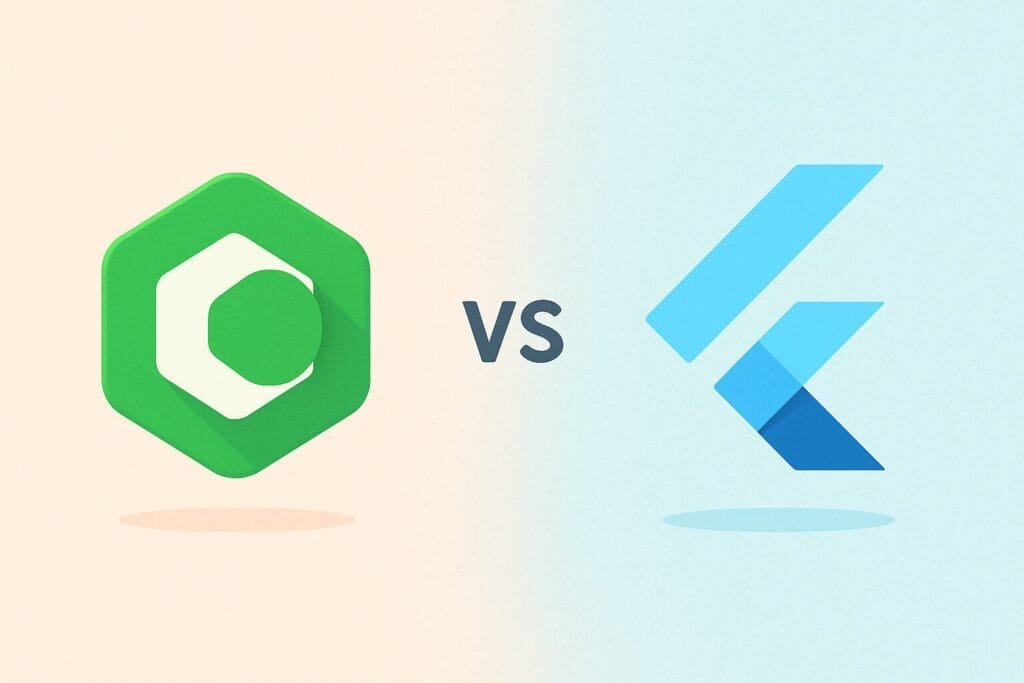When it comes to building modern mobile applications, two of the most popular frameworks available today are Jetpack Compose and Flutter. Both offer fast development, declarative UI design, and a vibrant ecosystem. But which one should you learn first? In this article, we’ll compare Jetpack Compose vs Flutter in terms of performance, learning curve, ecosystem, and career opportunities to help you make the right decision.

1. What Is Jetpack Compose?
Jetpack Compose is Google’s modern toolkit for building native Android user interfaces using Kotlin. Instead of relying on XML layouts, Compose allows developers to create UIs using a declarative programming style, similar to React. It simplifies UI creation and state management, offering a more streamlined and less boilerplate-heavy experience for Android developers.
Since Jetpack Compose is fully integrated with Android Studio and Kotlin, it’s particularly beneficial for developers who are already familiar with native Android development. It also supports Material Design components, animations, and full interoperability with existing Android views.
2. What Is Flutter?
Flutter is a cross-platform UI framework created by Google that enables developers to build apps for Android, iOS, web, and desktop using a single codebase. It uses the Dart programming language and a powerful rendering engine called Skia to deliver high-performance apps with a native-like experience.
Unlike Jetpack Compose, which targets Android specifically, Flutter’s biggest advantage is its cross-platform capability. Developers can create apps for multiple platforms simultaneously, saving both time and cost. Flutter has become a favorite among startups and enterprises for rapid app development.
3. Key Differences Between Jetpack Compose and Flutter
| Criteria | Jetpack Compose | Flutter |
|---|---|---|
| Programming Language | Kotlin | Dart |
| Platform Support | Android only (officially) | Android, iOS, Web, Desktop |
| Development Environment | Android Studio (native support) | Android Studio, Visual Studio Code, IntelliJ IDEA |
| Performance | Native Android performance | Near-native via Skia rendering engine |
| UI Components | Material Design, Jetpack Components | Material Design, Cupertino (iOS-style) |
| Community Support | Growing, strong among Android developers | Massive global community and plugins ecosystem |
| Learning Curve | Easier for Kotlin developers | Requires learning Dart |
| Use Case | Native Android apps | Cross-platform apps |
4. Performance Comparison
Performance is one of the most important factors when choosing a mobile development framework. Jetpack Compose runs natively on Android using the Kotlin compiler, meaning no additional rendering layers are introduced. This leads to superior integration and performance on Android devices.
Flutter, on the other hand, uses its own rendering engine (Skia) to draw every pixel on the screen. While this approach ensures consistent UI across platforms, it may consume more memory. Still, Flutter’s performance is close to native, often outperforming hybrid solutions like React Native.
5. Developer Experience and Productivity
Both Jetpack Compose and Flutter provide hot reload features that let developers instantly preview UI changes without rebuilding the entire app. However, the experience can differ based on your background:
- Jetpack Compose is ideal for developers familiar with Kotlin and Android Studio. The integration with existing Android projects is seamless.
- Flutter is a better option if you want to build for multiple platforms using a single codebase. It has excellent tooling, especially with Visual Studio Code.
6. Ecosystem and Community Support
Flutter currently enjoys a larger global community, with thousands of open-source packages and widgets. This makes it easy to integrate features like Firebase, animations, or REST APIs.
Jetpack Compose is newer and more focused on Android, but it’s growing rapidly. The Android team and Google have been adding more official support, including libraries like Compose Navigation, Compose Material 3, and Compose Multiplatform (still in development).
7. Career Opportunities
From a career standpoint, both Jetpack Compose and Flutter are in high demand. Flutter developers are sought after for cross-platform development, while Compose developers are valued in native Android projects. If your goal is to specialize in Android development, Jetpack Compose is a strong choice. However, if you want flexibility across platforms, Flutter offers more opportunities.
8. Which One Should You Learn?
The decision depends on your career goals and development focus:
- Choose Jetpack Compose if you plan to work mainly with Android and want deep integration with native APIs.
- Choose Flutter if you want to create apps that run on Android, iOS, web, and desktop from a single codebase.
For beginners, learning Flutter may be easier because it’s well-documented and platform-independent. But for Android developers, Jetpack Compose feels like a natural evolution.
9. Future Outlook
Both frameworks are developed by Google, and both will continue to evolve. Jetpack Compose is gradually expanding into desktop and web via Compose Multiplatform. Flutter is adding more stable support for web and desktop apps, making it a complete UI solution for all devices.
10. Conclusion
In the battle of Jetpack Compose vs Flutter, there’s no clear winner — it depends on your use case. If you want to build native Android apps using Kotlin, choose Compose. If you aim to build cross-platform apps with consistent UI across devices, go for Flutter. Either way, both are future-proof skills that can significantly boost your career in mobile development.
For further learning, check out Jetpack Compose official documentation to explore tutorials and samples.

